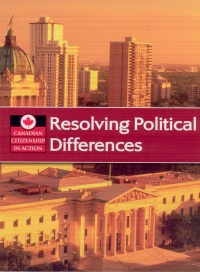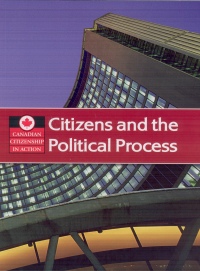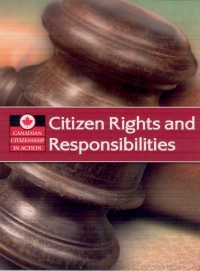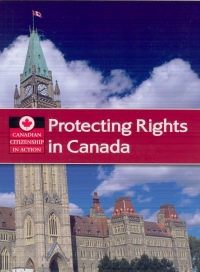| ________________
CM . . .
. Volume XVI Number 28. . . .March 26, 2010
This addition of four more books extends the scope of the “Canadian Citizenship in Action” series of which I reviewed the first four volumes a year or so ago (CM, Vol. 15, No. 9). Many of the comments I made then hold for these books as well. They have the same attractive formatting, including index and glossary, similar Viewpoint sections at the end of each volume, and the same length and general appropriateness of material for a Grade 4 to 8 classroom. There is inevitably overlap among these and the previous four volumes--Meech Lake features largely in both Resolving Political Differences and Citizens and Government, for example, but it is certainly appropriate in both contexts. The problem I think lies in that there are now more books in this series than the material covered demands. It is, however, difficult to imagine which of the volumes could have been eliminated. For a curriculum topic dealing with Canada and what it means to be Canadian, these books would be informative, instructive, and stimulating. Resolving Political Differences does a good job of outlining the many ways we, as Canadians, can influence political decision-making at the municipal, provincial, and federal levels. It does not even try to suggest that all attempts will be successful and is at some pains to point out that an issue that seems absolutely obvious to one person may have an opposing point of view that is equally obviously correct to someone from a different background or culture. Citizens and the Political Process gives short descriptions of the five major parties in the House of Commons, their histories, and how they developed the characteristics that they now have. The Viewpoint section in this volume deals with different "takes" on media influence on elections and public policy, but it does not mention the growing influence of the internet as one of the media in question. Since much of the information that young people absorb now comes from the Web, rather than either radio or newspapers, it should have been included in the discussion. Citizen Rights and Responsibilities mentions the basic human rights to food, shelter, and freedom from persecution, and then goes on to talk of civil rights, which come with citizenship in a particular country. The fact that these come with a responsibility is rightly emphasized--anything which can increase turn-out at the polls at election time is to be encouraged! Protecting Rights in Canada talks about the Charter of Rights and Freedoms, Canadian human rights acts, and how our laws have been changed over the years in attempts to ensure that minorities--racial, religious, linguistic, disabled--get fair treatment under the law and in the workplace. It does not talk about the abuses that have been countenanced in the name of some of these "rights," though it does point out that, for example, one person's hate literature is another's freedom of speech. In all things, there are many points of view. The great strength of this set of books is that it does stress the many sides that exist to even the simplest questions. Teaching this sort of material is difficult because there are seldom absolutely right or wrong answers, but setting out the arguments is helpful, if confusing, for students. They have to realize at some point that their "gut feelings" should not be the basis for important decisions, and a balanced approach, such as that found these books, makes for more reasonable choices. Recommended. Mary Thomas lives and works in Winnipeg, MB. and always votes, even in municipal elections.
To comment
on this title or this review, send mail to cm@umanitoba.ca.
Copyright © the Manitoba Library Association. Reproduction for personal
use is permitted only if this copyright notice is maintained. Any
other reproduction is prohibited without permission.
NEXT REVIEW |
TABLE OF CONTENTS FOR THIS ISSUE
- March 26, 2010.
AUTHORS |
TITLES |
MEDIA REVIEWS |
PROFILES |
BACK ISSUES |
SEARCH |
CMARCHIVE |
HOME |



